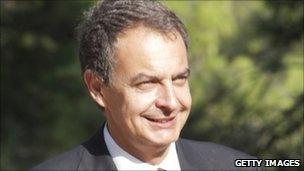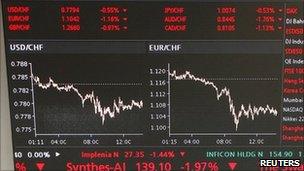The eurozone's August blues
- Published
- comments

Spanish PM Zapatero: Holiday delayed, but still smiling
Europe takes its holidays seriously. The great migrations to the coast. The clogged motorways. The politicians snapping up remote villas. The mountain hideaways.
But the eurozone crisis threatens to disrupt August plans. Already Spanish Prime Minister Jose Luis Rodriguez Zapatero has delayed his departure, as the bond markets drive up Spain's borrowing costs.
It has been a pattern of the eurozone crisis that a summit buys a few days relief. European officials emerge into the camera lights to insist that this time a comprehensive solution is in place. A few days pass and then reality sets in.
So it was with the summit two weeks ago.
'Scary thing'
Here's the problem: The markets look at many European economies and see high debt, high unemployment, low growth and fragile banks. The sums don't add up. Where will the growth spring from to bring down the debt?
With Greece they have seen a second bailout that will result in private investors taking losses. Suddenly buying up a tranche of European debt doesn't look very attractive.
In the past two days borrowing costs for Spain and Italy have reached 14-year highs. The President of the European Commission, Jose Manuel Barroso, said the market pressure was "clearly unwarranted" but was cause for "deep concern."
Finnish Prime Minister Jyrki Katainen described what was happening as a "a very alarming and scary thing... The whole of Europe," he said, "is in a very dangerous situation."
Europe's vulnerable economies often don't help themselves. Austerity packages are often not what they seem.
Italy recently agreed to 70bn euros ($100bn; £61bn) of savings. The plan was hurried through the Italian parliament in five days and was widely praised in Brussels. But most of the measures don't kick in until 2013. The senators and deputies show no sign of being seriously willing to trim Italy's bloated public sector, which includes extravagant pensions for politicians. Even measures to open up professions and free up the labour markets are met with resistance.
Italian President Giorgio Napolitano recognises that Italy has to embrace growth.

Markets are wondering where the growth to bring down European debt will come from
"At this moment, it is up to the political forces," he said, "both in the government and opposition, to work with civil society to make choices to decisively stimulate the indispensable growth of the economy and employment."
With Greece there are grave doubts whether the country can deliver on its commitments both to make further savings and to sell off state assets. Strong resistance to these measures remains.
Europe has not yet understood that the eurozone crisis is not just about taking steps towards greater fiscal co-ordination.
The crisis poses a challenge to Europe's social model: The welfare programmes, the safety nets, the working hours, the employment legislation, etc.
Europe is not competing with itself but with the rest of the world. It is often at the last moment that countries have embraced reform but many more challenging decisions lie ahead if Europe is to find the growth it so desperately needs.
There are still many details from the past summit that have to be worked out.
The final communique was a mess. The figures were opaque and sowed distrust. Some of the measures like agreeing to the expansion in powers for the European Financial Stability Facility - the EU's main rescue fund - will have to be approved by national parliaments and that takes time.
Some of those measures will enable the fund to act pre-emptively, offering short-term loans - and President Barroso has called on parliaments to take decisions "without delay".
He also said that the market tremors "reflect a growing concern among investors about the systemic capacity of the euro area to respond to evolving crises". It was a rare acceptance that investors are doubting whether the structures are in place to fight this crisis.
Fiscal union
The key challenge is growth, but an equal problem is political.
Some politicians have openly said that the answer to the crisis is "more Europe". Others accept that the more prosperous countries like Germany will have to end up bankrolling the weaker countries if the eurozone is to survive. That is not what the Germans signed up for. As so often happens in Europe, officials are pulling in one direction and voters in another.
At some stage - if it materialises - fiscal union will have to be put to the voters. It cannot be slid through by stealth or incrementally.
Down the road a great tussle lies between those who want a closer Europe and those who want a looser, more pragmatic Europe. That struggle is always there but it is being brought closer by the continuing eurozone crisis.
This was going to be my final blog for August. I was going to do some presenting before taking a holiday. I fear that I, too, may find my plans disrupted - but if not, thanks to those who read my blog whether you agree or vehemently disagree.